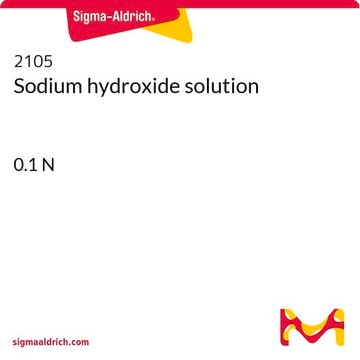1.09140
Sodium hydroxide solution
c(NaOH) = 0.2 mol/l (0.2 N), ready-to-use volumetric solution for titration, Titriplex®
About This Item
Recommended Products
product name
Sodium hydroxide solution, c(NaOH) = 0.2 mol/l (0.2 N), Titripur®
vapor pressure
3 mmHg ( 37 °C)
Quality Level
product line
Titripur®
form
liquid
quality
Analyzed in our ISO 17025 accredited QC lab
reaction suitability
reaction type: Acid-base reactions
packaging
Titripac® of
concentration
0.2 M
technique(s)
titration: suitable
pH
13 (20 °C in H2O)
density
1.01 g/cm3 at 20 °C
storage temp.
15-25°C
SMILES string
[OH-].[Na+]
InChI
1S/Na.H2O/h;1H2/q+1;/p-1
InChI key
HEMHJVSKTPXQMS-UHFFFAOYSA-M
Looking for similar products? Visit Product Comparison Guide
Features and Benefits
This volumetric solution is analyzed by our calibration laboratory D-K-15185-01-00 which is accredited according to DIN EN ISO/IEC 17025 for analysis of amount-of-substance concentrations in volumetric solutions by DAkkS (Deutsche Akkreditierungsstelle - German National Accreditation Body). The accreditation certificate can be found at www.sigmaaldrich.com/ISO17025.
Packaging
Titripac® packaging - all SKU-pack size numbers ending "4000, 4003, 9010, 9013" - more information on www.sigmaaldrich.com/Titripac
Analysis Note
Amount-of-substance concentration 0.1990 - 0.2010 mol/L
Measurement uncertainty ± 0.0006 mol/L
Traceability NIST SRM
The concentration is determined by volumetric titration and refers to 20°C.
The amount-of-substance concentration of this volumetric solution is traceable to a primary standard reference material (SRM) from the National Institute of Standards and Technology, Gaithersburg, USA (NIST SRM 84 potassium hydrogen phthalate) by means of volumetric standard potassium hydrogen phthalate (article number 1.02400), certified reference material according to ISO 17034, analyzed by our accredited calibration laboratory of Merck KGaA, Darmstadt, Germany according to DIN EN ISO/IEC 17025. The uncertainty is expressed as expanded measurement uncertainty with a coverage factor k=2 covering a confidence level of 95%.
Note: The titer is a correction factor to correct for variations of the volumetric solution, the titration equipment, the temperature and other laboratory conditions. For correct titration results it is recommended to determine a titer with the laboratory specific equipment and under laboratory specific conditions directly after opening a new bottle and at regular time intervals.
Legal Information
related product
signalword
Warning
hcodes
Hazard Classifications
Eye Irrit. 2 - Met. Corr. 1 - Skin Irrit. 2
Storage Class
8B - Non-combustible, corrosive hazardous materials
wgk_germany
nwg
flash_point_f
Not applicable
flash_point_c
Not applicable
Certificates of Analysis (COA)
Search for Certificates of Analysis (COA) by entering the products Lot/Batch Number. Lot and Batch Numbers can be found on a product’s label following the words ‘Lot’ or ‘Batch’.
Already Own This Product?
Find documentation for the products that you have recently purchased in the Document Library.
Customers Also Viewed
Related Content
FAS, or 'forever chemicals,' persist in the environment and pose risks to human health. Discover our environmental monitoring tools for PFAS quantification, aiding researchers, regulators, and labs in testing for PFAS.
Our team of scientists has experience in all areas of research including Life Science, Material Science, Chemical Synthesis, Chromatography, Analytical and many others.
Contact Technical Service





